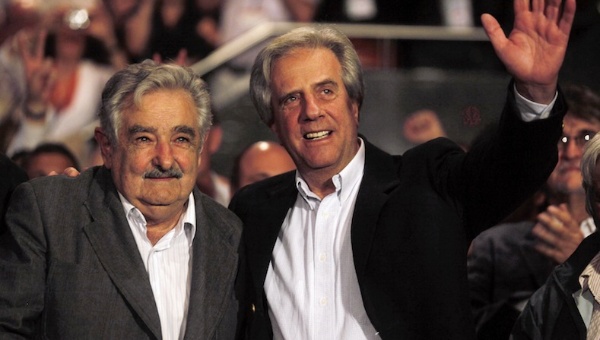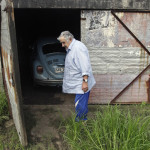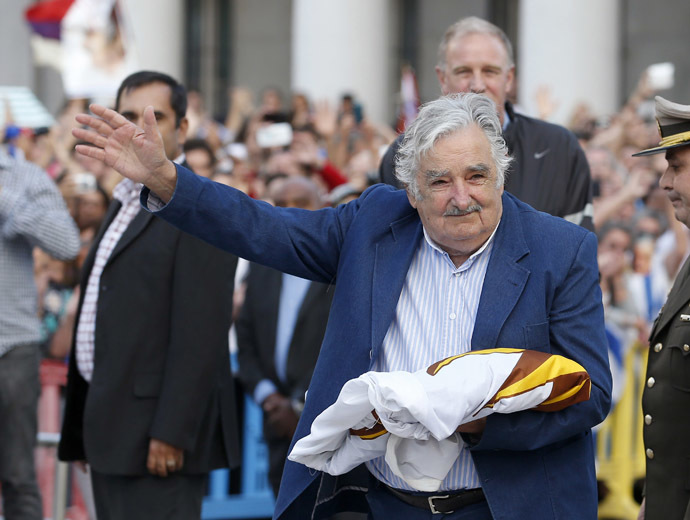
Ex-guerrilla, pot-legalizing, champion of the poor president: Uruguay’s Mujica steps down
Uruguay’s president, Jose “Pepe” Mujica, a former guerrilla who lives on a farm and gives most of his salary to charity, is stepping down after five years in office, ending his term as one of the world’s most popular leaders ever.
Mujica, 79, is leaving office with a 65 percent approval rating. He is constitutionally prohibited from serving consecutive terms.
“I became president filled with idealism, but then reality hit,” Mujica said in an interview with a local newspaper earlier this week, according to AFP.
Some call him “the world’s poorest president.” Others the “president every other country would like to have.” But Mujica says “there’s still so much to do” and hopes that the next government, led by Tabare Vazquez (who was elected president for a second time last November) will be “better than mine and will have greater success.”
Mujica said he succeeded in putting Uruguay on the world map. He managed to turn the cattle-ranching country, home to 3,4 million people, into an energy-exporting nation, Brazil being Uruguay’s top export market (followed by China, Argentina, Venezuela and the US.)
Uruguay’s $55 billion economy has grown an average 5.7 percent annually since 2005, according to the World Bank. Uruguay has maintained its decreasing trend in public debt-to-GDP ratio – from 100 percent in 2003 to 60 percent by 2014. It has also managed to decrease the cost of its debt, and reduce dollarization – from 80 percent in 2002 to 50 percent in 2014.
“We’ve had positive years for equality. Ten years ago, about 39 percent of Uruguayans lived below the poverty line; we’ve brought that down to under 11 percent and we’ve reduced extreme poverty from 5 percent to only 0.5 percent,” Mujica told the Guardian in November.
After Latin America’s anti-drug war proved a failure, the South American country became the first in the world to fully legalize marijuana, with Mujica arguing that drug trafficking is in fact more dangerous than marijuana itself.
One of the most progressive leaders in Latin America. Muijica also legalized abortion and same-sex marriage and agreed to take in detainees once held at the notorious Guantanamo Bay. Six former US detainees, who were never charged with a crime, came to Uruguay in December as refugees. The six included four Syrians, a Palestinian and a Tunisian. Although they were cleared for release back in 2009, the US was not able to discharge them until Uruguayan President offered to receive them.
Mujica, a former leftist Tupamaro guerrilla leader, spent 13 years in jail during the years of Uruguay’s military dictatorship. He survived torture and endless months of solitary confinement. Majica said he never regretted his time in jail, which he believes helped shape his character.
Mujica’s kindness speaks volumes: He refused to move to Uruguay’s luxurious presidential mansion to live in a farm outside Montevideo with his wife and a three-legged dog named Manuela. Pepe gives away about 90 percent of his salary to charity, saying he simply doesn’t need it. He drives an 1987 Volkswagen Beetle.
Last year, Mujica turned down a $1 million offer from an Arab sheik who offered to buy his blue car. Pepe refused to sell the vehicle, saying it would offend “all those friends who pooled together to buy it for us.”
In January, a young Uruguayan man posted a message on his Facebook page recounting how Mujica and his wife picked him up while he was hitchhiking.
“On Monday, I was looking for a ride from Conchilla and guess who picked me up on the road?” Gerhald Acosta wrote on his Facebook post January 7. “They were the only ones who would stop!”
“When I got out, I thanked them profusely because not everyone helps someone out on the road, and much less a president,” the man told Uruguay’s El Observador newspaper.
(From: RT)




